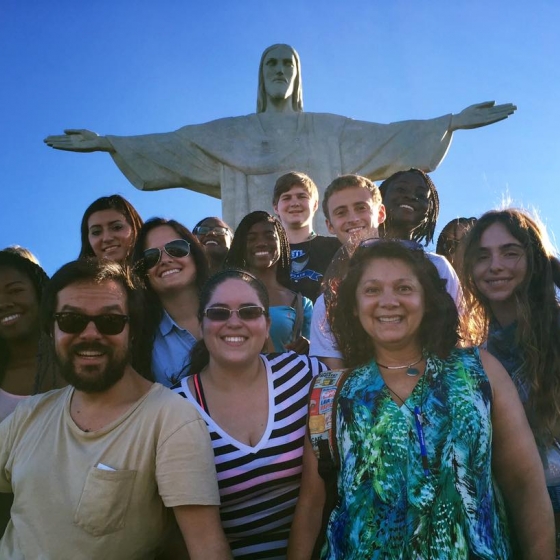Duke requires all students to demonstrate proficiency in a foreign language at the intermediate or advanced level. Courses suitable for meeting this requirement are designed with an FL (Foreign Language) curriculum code. Depending on your language proficiency, you must complete one of the following:
- Option One: If you begin language study at Duke in an elementary language course, you must take 3 full courses in that language to meet your FL requirement for graduation, OR
- Option Two: If you enter language study at Duke at the intermediate level or above, the successful completion of a 300-level FL-designated course will fulfill your requirement.
- If you place in the first semester of the intermediate level, you will need to take at least 3 full consecutive courses in the same language.
- If you place into the second semester of the intermediate level, you will need to take at least 2 full consecutive courses in the same language.
- If you place in a 300-level course, you will only need to take 1 course.
The course description and placement guidelines that follow should help you choose the proper gateway course given your background. Portuguese courses do fulfill the general education foreign language (FL) requirements. There are no AP, IB or SAT placement tests for Portuguese.
| If you have this background: | You should take this course: |
|---|---|
Elementary Portuguese - 100 level courses | |
| Portugue 101: Elementary Portuguese 1 - Introduces the basic elements of the language and includes an exposure to some aspects of Portuguese-speaking cultures. Aural comprehension, speaking, reading, and writing skills receive equal attention. Conducted in Portuguese, using a communicative approach. Three class meetings a week (M,W,F). |
| Portugue 102: Elementary Portuguese 2 - Builds on the elements of language acquired in Elementary Portuguese 101; enrollment in Portuguese 102 presupposes acquisition of the contents covered in Portuguese 101. Speaking, reading, and writing skills emphasized; exposure to some aspects of Portuguese-speaking cultures an important component. Conducted entirely in Portuguese, using a communicative approach. Three class meetings a week (M,W,F). |
| Portugue 112: Accelerated Elementary Portuguese - Covers the elementary Portuguese language curriculum (Portuguese 101 and 102) in one semester. Designed for highly motivated undergraduate and graduate students as well as fluent speakers of another Romance language. Most grammar and textbook work is done outside of class, freeing class time for more communicative activities. Conversation sessions provide intensive work on grammar focused through discussion on issues raised in films, news media, readings, music. Three class meetings a week (M,W,F). |
Intermediate Portuguese - 200 level courses | |
| Portugue 203: Intermediate Portuguese - Intensive language review of reading, writing, and oral practice, with increased attention to grammatical variety and accuracy. Cultural component emphasized through short readings, videos, music. |
| Portugue 204: Advanced Intermediate Portuguese - An advanced grammar review complemented by oral practice, composition, videos, and selected literary readings. Guided essay writing on topics related to the readings and videos. Second part of an intermediate sequence; suggested as preparation for 300-level courses. |
Advanced Portuguese - 300 level courses | |
| Portugue 301S: Advanced Colloquial Portuguese - Advanced conversation and composition through the study of colloquial Portuguese as a catalyst of popular culture; extensive comparisons of popular sayings, expressions, and proverbs; emphasis on oral communication. Contemporary short texts, ''telenovelas,'' video, music, and Internet sources. Highlights differences between Portuguese as spoken in Portugal and Brazilian Portuguese (syntax, vocabulary, spelling); transmits a sense of African, Azorian, and Asian Portuguese, and United States Portuguese communities. Portugue 334S: Introduction to Brazilian Literature - Major writers and movements of Brazilian literature from the period of discovery to present, using short texts, novels, plays, short stories. Includes early letters of discovery, Machado de Assis, Mario de Andrade, Clarice Lispector. See the 'Courses' tab near the top of the page for a full listing of Portuguese courses beyond those mentioned here. |
Brazilian Portuguese Language Resource
Sonia Portuguese (www.sonia-portuguese.com)
Translation Resource
Online English/Portuguese | Portuguese/English Dictionary (http://www.freedict.com/onldict/por.html)
Information about Portugal
Portuguese Language - Wikipiedia (http://en.wikipedia.org/wiki/Portuguese_language)
AICEP Portugal Global (www.portugalglobal.org) is a government business entity whose websites provides useful information about Portugal and the Lusophone culture.
Governo de Portugal (www.portugal.gov.pt/en.aspx) is the official Portuguese government's website.
Duke Language Labs
- 114 Languages Building (West Campus)
- 101 Carr Building (East Campus)
Duke Global Education Office
The Duke University Global Education Office for Undergraduates jointly administers a program with the Department of Romance Studies that offers an intensive Portuguese language component. Please see the Global Education links below for the following programs:
- Duke in Brazil (Summer)
There are also many other global education programs available that are administered by other organizations. See the Global Education Office website.
Bate-Papo Brasil
The Duke Bate-Papo Brasil group provides an opportunity for Portuguese conversation at all levels. The group organizes lectures on Brazilian social, environmental, business issues around the Duke and UNC campuses, and cultural and social events with carnaval, samba, pagode, capoeira and Brazilian culinary exploration.
For more information contact Magda Silva, cultural advisor and coordinator of the Portuguese Language Program, at mbcsilva@duke.edu or 919-660-3128.



